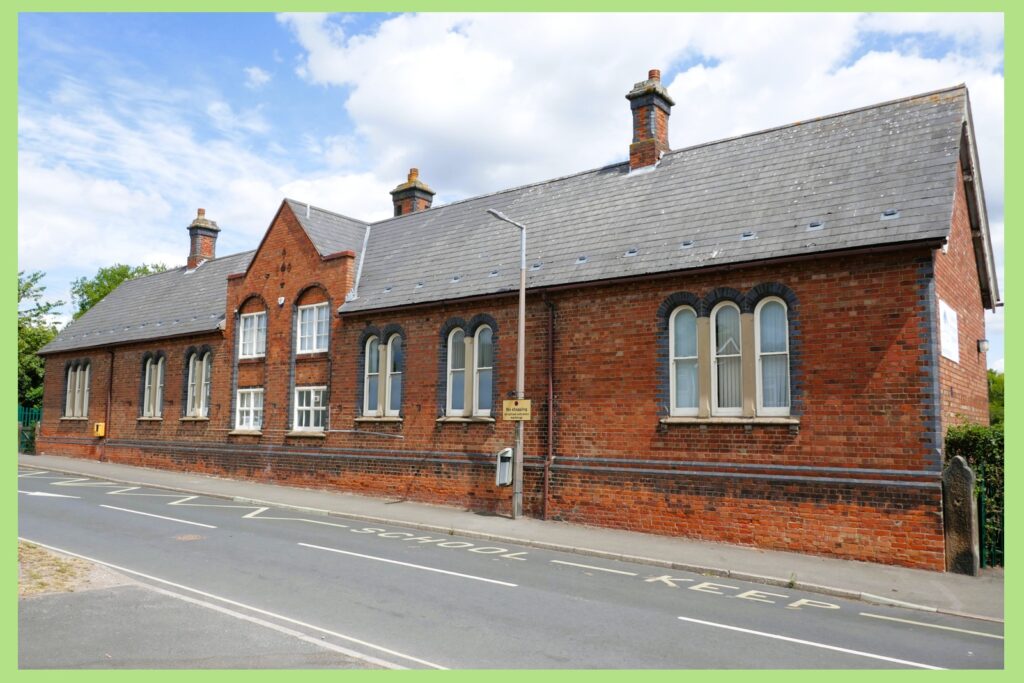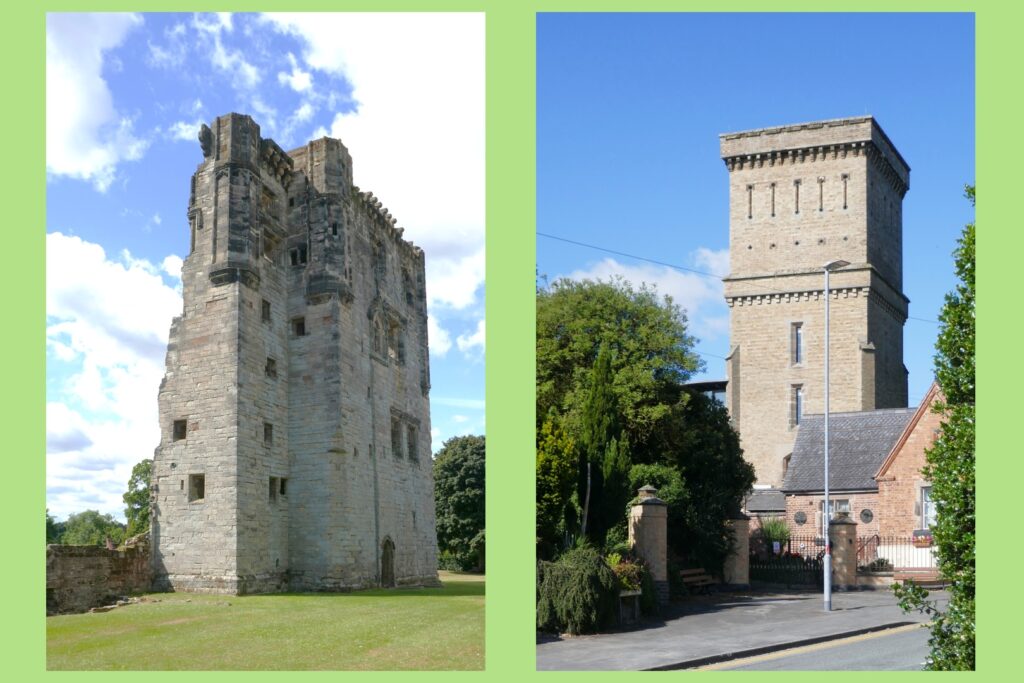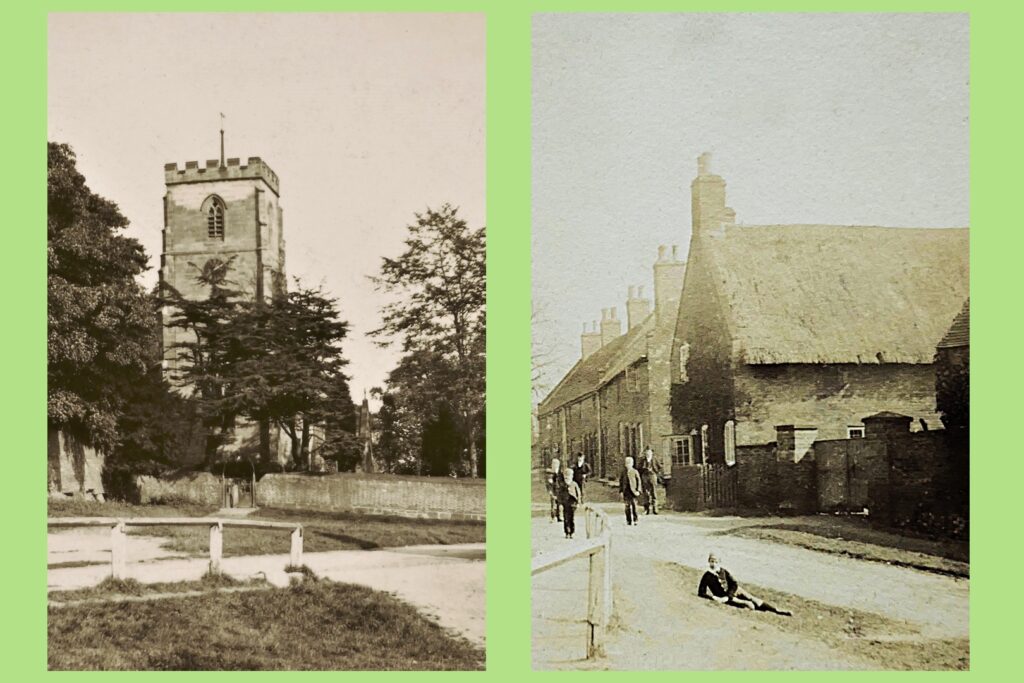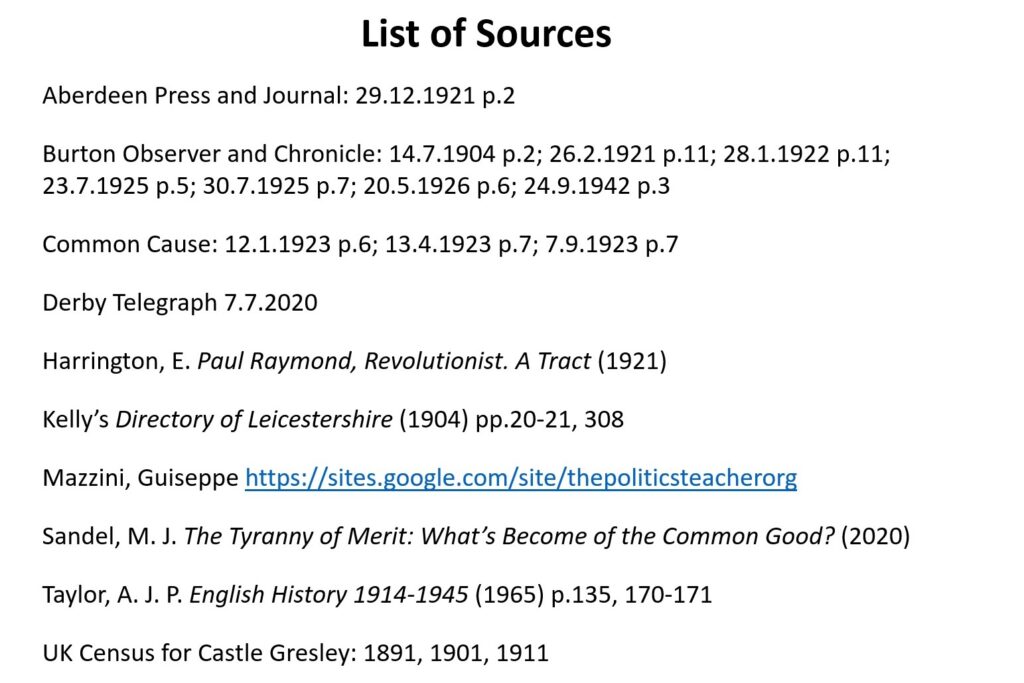Searching for a South Derbyshire novel, I found Paul Raymond, Revolutionist in the local history section of Swadlincote library. No one I’ve met owns the book. Nor have I seen it for sale online.
When published in 1921, the book’s title was unappealing to most. In that year, Russia’s Bolshevik government crushed its opponents, ending a civil war. In England, social unrest ignited fears of radical action. Major Coleman, a Labour Party agent, upset his audience when he mentioned the possibility of red flags flying from Burton-on-Trent’s brewery chimneys. In an attempt to backtrack, he said: Labour opposes the chaos and bloodshed of revolution.
The novel’s London publisher sent copies to regional newspapers for review. Few commented, or even mentioned the book. The Aberdeen Journal thought it too long, and its revolutionist element mild. The characters were not bearded Bolsheviks, just ordinary English folk.
The Burton Chronicle learned that the author belonged to a local family. It supported her exposure of flaws in England’s education system. It thought her writing effective, despite her self-conscious style.
Minnie Farmer gave Paul Raymond, Revolutionist, the sub-title, A Tract. She interrupted her fictional story to express strong opinions about her characters. She aimed to persuade readers of a need for social change.
To reduce political tension and avoid mention of the Great War, Farmer set her novel in the Edwardian period. It’s hero, Paul Raymond, shared her South Derbyshire background and a broadly similar career.
So, let’s examine the views of this forgotten author as expressed in her novel. She offers insights into a facet of early twentieth century life, so I want her voice to stand out. Yet some commentary from historical and modern perspectives is needed. Thus, I’ll both summarise her story and evaluate her thinking.
The Formation of a Revolutionist Author
Born in 1884, Minnie Farmer was the fourth of ten children. The family lived on Burton Road, Castle Gresley.
Minnie’s father was a mechanical engineer. With two of his brothers, he set up a business which made machinery for local potteries. Although he remained a partner, in 1876 he moved to Mansfield Brothers. A foreman in 1891, he later became works manager. After fifty years’ service, the company gave him a family Bible and a mahogany clock.
In 1889, Harrington Farmer became a local preacher in the area’s Wesleyan Methodist circuit. His family firm supported Castle Gresley’s Station Street chapel, and contributed to its rebuilding in 1905. The family were regular attenders at chapel, and Minnie’s novel shows extensive knowledge of the Bible.
As a Castle Gresley child, Minnie Farmer attended Linton’s elementary school. She then became an apprentice teacher, supervised by Linton’s headmaster. Never an A-star student, she laboured for seven years to pass the King’s scholarship exam, rather than the normal five. To study for a formal teaching qualification, she entered a training college in 1904.
By 1911, London City Council employed Farmer as a schoolmistress. She lodged in the Hackney area, and may have taught in the East End. In 1917, a German bomb killed eighteen children in a neighbouring school. This news upset her.
In addition to teaching, Farmer joined the Women’s International League for Peace and Freedom. Economic depression and hunger stalked post-war Europe, and Farmer travelled in Germany, Holland, and other nations. The League aimed to overcome barriers to world friendship. It turned its back on the war-spirit, and worked to develop enlightened views on foreign affairs.
Paul Raymond, Revolutionist reveals a serious-minded, principled author. Possibly to protect her parents from local gossip, she published the book under a pseudonym. She honoured them by using their first names: Elizabeth Harrington.

The Novel’s Market Town Nurtured Injustice
Six miles to the west of Castle Gresley, lies Ashby-de-la-Zouch. Farmer described a fictional version of the town in her novel, and called it Ashleigh. Seeds sown here prompted her hero to become a revolutionist.
Farmer saw her characters as moulded, in part, by their physical and social environment. For example, Ashleigh boasted the ruins of a castle. In its glory days, the area’s lesser gentry came to offer service to its lord. When it decayed, they retreated to their mansions to enjoy sport and comfort. Thus, they employed lawyers to manage their estates. However, idleness blinded them to the greed of some agents. So, Ashleigh’s solicitors, as a class, embodied the sickness implicit in the town’s broken-down castle.
In the real-life Ashby-de-la-Zouch, at least two nineteenth century lawyers defrauded their clients. In particular, the story of John Mammatt’s fake death and escape to America remained in people’s memory. Farmer’s critique of Ashleigh’s legal profession both echoed local history and helped her fictional plot.
Paul Raymond, Revolutionist offered black and white contrasts. If the castle symbolised rottenness, at the opposite end of Ashleigh stood its water tower, a wonder of modern usefulness. The main street included thatched dwellings, and rows of new houses stretched up the surrounding hills. However, a railway embankment across the south of the town spoilt the area’s natural beauty.
Socially, good people lived in Ashleigh, including the kindly Mrs Verity who dealt in lace. Most were slow-going and provincial. Others, however, cared about status, judging people on how useful they might be. This soured relationships. Trust and kindness often seemed lacking.
Farmer critiqued Ashleigh’s morality, and highlighted the value of productive labour. Her main character had a well-educated father who served the community. Shortly before he died, Dr Raymond lent his half-brother £500 to buy a partnership in an Ashleigh legal practice. With the debt cancelled by death, Jabez Smart failed to help the five-year-old Paul and his mother in their reduced circumstances.

How a Rural Retreat Raised a Revolutionist
Dr Raymond left his wife half what he’d owned before his loan to Smart. Helen could no longer afford to live in Ashleigh, so she bought a cottage in Nethervale. Her income became closer to that of an agricultural labourer.
Paul attended the village school, and then became a pupil teacher at Lynwood. Farmer’s description of his daily journey tallies with an actual footpath between Netherseal and Linton in South Derbyshire.
Again, Farmer reflected on a tall building. She saw Nethervale’s church as a friendly watcher of people’s lives. The church breathed a spirit of calm and awe over the peaceful village. Here, many generations had presented good thoughts to their idea of God.
The church stood on high ground at one end of a miniature green. At the other end, lay Paul’s home and the village school. To the south of the church, the land sloped gently down to a tiny river.
Of course, even a village has drawbacks. On the one hand, women were friendly enough with neighbours to enter each other’s homes without knocking. On the other, if anyone shared a piece of personal news, the entire community soon knew it.
Farmer called Nethervale a typical agricultural village, though she omitted landowners and clergy. In reality, they made their presence felt.
As for the novel’s farm labourers, they blended into the landscape. They moved with slow, heavy steps. Their measured ways kept time with Nature: home and rest, then more toil. Most lived as if nothing existed beyond what they saw and handled.
Farmer created an impression of rural seclusion and peace, where class relations and political opinion absented themselves. This suited her novel’s purpose. What better background for the making of a revolutionist than plain, honest living in a rustic environment?
A Revolutionist at Home
Paul and his mother lived in Hope Cottage, opposite Nethervale’s green. Ivy surrounded its front door and windows, though Helen kept the plant well-trimmed. The house’s clean and tidy appearance reflected its occupants’ approach to life.
Inside, a cat purred on the home-made hearthrug. As evening fell, Helen lit a brass oil-lamp and placed a spotless white cloth on the table. For tea, they ate bread and scones, butter from Dovecote farm, and honey from a neighbour’s bees. Later, they enjoyed a supper of bread, cheese and cocoa.
Like other village women, Helen’s daily routine began with cleaning the grate, drawing water from the well, and placing the kettle by a newly lit fire. Yet Helen’s character differed from wives of labourers. She took more pride in her appearance, valued polite formalities, and expressed feelings in a restrained way. She did not burden Paul with her sense of injustice.
As a pupil-teacher, Paul was keen to progress. He spent his evenings in personal study or attending classes. He found a friend in Justin Miles, a tenant farmer who possessed a large library.
When Paul passed the King’s scholarship exam, he applied to a teaching training college. Helen asked Smart for £100 towards the cost. Smart agreed, but then left Ashleigh without leaving a forwarding address. Helen had to explain the situation to Paul. For a while, it looked as if Paul’s longing for a fuller life would be dashed. Helen, however, found a way.

with alms houses beyond, is thatched and ivy is growing up the gable wall. Its appearance
is less orderly than Farmer’s description of Hope Cottage.
A Budding Revolutionist in the Nation’s Capital
Paul travelled from a domestic and rural idyll to a noxious city. Even the name Farmer gave to London expressed her disapproval. Yet in spite of Mammonsbury’s evils, Paul’s moral anchor held firm.
Mammonsbury gave an impression of bustle and excitement. Horse drawn vehicles threaded their way through maze like streets. Pedestrians of all nationalities mingled with traffic when crossing roads. Yet in their rush, people seemed wooden. No time to be polite or kind.
Some queued for nearly an hour to get into a theatre. A waste of time, thought Paul. Stopping at a café for tea and a bread roll, he considered it inferior to food in Nethervale.
For Paul, the glitter and show of the West End hid spiritual hollowness. Behind the jewels, satins and carriages, he saw the selfishness responsible for social wrongs. Comforted by society’s superficial shams, the wealthy deceived themselves into embracing false standards.
Farmer’s clunky criticisms extended to Nelson’s column in Trafalgar Square. She belittled Admiral Nelson’s achievement and deplored the cost of his monument. The government should have spent the money on relieving child poverty and banning prostitution.
Close to Mammonsbury’s river, Paul saw the Houses of Incompetence and Indecision where giant intellects governed the land. Farmer held Parliament responsible for England’s injustices, and used insult to shame all who choked goodness. She saw gentry as parasites. She called Smart’s son a putrid excrescence. Paul showed civility only to those who he felt deserved it. Thus, the mindset of a revolutionist who sees truths which others don’t, began to harden.
Farmer worked for justice and goodness, but appears self-righteous. Convinced of her own moral correctness, she lacked empathy for the complexities of a modern society.
Educationalists Suppress Paul’s Ambitions
After two years at college, Paul found lodgings at 13 Aspiration Road, Highville. Each day he travelled into the poverty and squalor of Ditchley. His class at Keepdown School seemed, at first, like a tribe of lawless hooligans. Yet he learned to love them, and his qualities brought out their potential for good.
Paul dreamed of becoming head of a public school. He studied for a BA degree, and passed with first class honours. He then applied for a post in a secondary school but received no answers. Told to gain experience in a higher elementary school, he found a job at Hopend where he taught students to the age of sixteen.
Paul thought hard work and merit led to success. Thus, he would make up for his lack of secondary education. However, Mammonsbury’s Education Committee barred elementary teachers from the secondary system, no matter how good their qualifications. When Paul realised Jabez Smart was both aware of him and on the Education Committee, he lost hope.
According to Farmer, England offered an inferior education to the poor, whilst repressing all who aimed higher. It protected public-school culture in secondary schools and stamped on merit in the lower orders. Thus, it ruined the prospects of bright but poor children, and fostered a revolutionist spirit. The question is: was Farmer’s point valid?
During the First World War, politicians promised secondary education for all. The 1918 Education Act raised the school leaving age from twelve to fourteen, and abolished fees in state schools. However, schooling for the well-off remained superior in quality, and secondary education did not expand. With the economy in crisis, the government cut funding for education and welfare. So, yes, class divisions continued to have an adverse effect on the nation’s system of education.
Paul Becomes a Revolutionist
We now come to the heart of Farmer’s revolutionist tract. I’ll summarise her line of thought, saving my comments until later. However, it’s worth remembering in what follows that Farmer wrote after a war in which suffering and loss tore at people’s faith in God.
Broken by the false standards and polite lies of English society, Paul saw how class defeated merit. The educational hierarchy pushed the poor into a shadowy underworld while they pursued wealth and social success. The weight of Paul’s ruined ambition crushed him. It made him bitter. His health suffered. A doctor told him to rest.
Paul travelled to Devon’s coast to visit a friend. In sorrow, he struggled to find a different relationship with society. The disadvantages of the boys he taught dug into his mind. He would not give up; what’s right must win.
One day, as he stood on a cliff, facing the sea, Paul experienced the energy and inspiration of Nature. He caught a glimpse of himself working merely to satisfy his material desires. In that moment of inner pain, he prayed: Spirit of Goodness and Truth, show me the way.
Nature then showed him figures from history who laboured for the oppressed: Jesus, his follower Stephen, and Abraham Lincoln. They’d toiled for justice and humanity, and found victory in martyrdom. No one could kill their souls, the ideals for which they’d laboured. In a moment of spiritual transformation, Paul determined to work for the whole human family, not for the good of individuals alone.
Let the Revolution Begin
Back in Hopend, Paul felt a greater responsibility to his boys, and saw them in a new relationship with social injustice. He must prepare them to fight corruption and dishonesty. If a greater proportion of the poor were better equipped, the force of Nature within humanity would breach class barriers and achieve fullness of life for all.
As a teacher, Paul had aimed to produce results to satisfy his conscience and his headmaster. He now worked for human equality and welfare. His boys needed the knowledge and wisdom to become men of truth and courage.
Paul rented another room from his landlady and furnished it with a dozen chairs. Here he held evening classes in which he taught his own curriculum.
He told his boys of humanity’s struggle for justice and liberty throughout history. Privilege, selfishness and tyranny caused many grievances, yet the masses were slow to rebel. When revolutions occurred, they expressed right against wrong but were far from glorious. To avoid past violence, every child should have access to secondary school and university. Wealth of knowledge would act against social injustice, and rein in the excesses of revolution.
So, twelve boys met with Paul three times a week, and soon caught his spirit of righteousness. Meanwhile, Smart persuaded the Education Committee to order Paul to cease his classes. Matters came to a head when Smart addressed a meeting at Hopend. Paul’s response so enraged Smart, he threw himself at Paul. Paul fell, and received a fatal injury.
Before he died, Paul expressed his belief in the eternal progress of human souls. He would meet those he loved again, and they would travel forward together. At Paul’s funeral in Nethervale, his boys promised to work for the ideals he’d taught them.
Conclusion and Writer’s Thoughts
1. Minnie Farmer Deserves Respect and Sympathy
Some aspects of Farmer’s writing, I dislike. Paul’s sense of moral superiority grates, and Farmer moves beyond fair criticism to fault finding. In addition, her idealism was never really credible, though in the aftermath of horrific suffering and violence it seemed attractive at the time.
Whatever our view of Farmer, for someone who never went to secondary school her book was a great achievement. Determined to educate herself beyond what the state provided, she could quote Romantic poets, reference philosophical thinkers, and handle complex ideas fluently. She wrote in a serious, intense style to benefit humanity, especially the poor. She worked hard and she cared.
In 1925, Farmer taught in London, had almost finished another book, and was invited to a peace conference in Paris. By April it became too much for her. She suffered a nervous breakdown, and a doctor advised her to return home to Castle Gresley and rest. In June, a local doctor listened to her symptoms of fatigue, distress, and weakness. He told her she shouldn’t even try to work.
One night in July, when the family were asleep, Minnie Farmer slipped out of the house. A policeman saw her walking briskly in the direction of Castle Gresley’s Nursery. Here, in its reservoir, she drowned herself. She was 42 years old.
In her bedroom, Farmer left letters for her parents and the coroner. A week later, a Wesleyan minister conducted her burial service in Linton’s churchyard. No monument marks her grave.
Farmer had a tragic end, as did Paul Raymond. Was she too idealistic to survive in a flawed world? I guess she expected more of herself than she could handle in practice.
2. Farmer Kept Much of her Chapel Culture
At first, I thought Farmer was attracted to Marxism. A more likely influence is Guiseppe Mazzini, a nineteenth century socialist and democrat. Farmer both referred to him and favoured his idea of awakening a nation’s soul. Like Mazzini, she opposed rationalism and materialism. She comes close to the idea of a Marxist class struggle, yet wanted people of all classes to unite in overcoming injustice.
Farmer disliked institutional religion. She thought Church of England clergy uncharitable and its congregations self-satisfied. In her eyes, they were all alike. She wasn’t wholly opposed to going to church, but her spiritual life lay outside organised religion and belief in a Higher Power.
As a humanist, Farmer gave her understanding of the best in humanity an almost supernatural role. She depicted the possibility of horizontal connection with Nature as life-changing. In this context, her admiration for Jesus Christ as a moral and spiritual leader makes sense. Whoever does what’s right for humanity is a light of the world. They belong to the ray-monde family.
Paul Raymond’s moment of spiritual transformation was fictional. However, it was similar to chapel conversion stories and Farmer showed understanding of that kind of experience. It may have formed part of her identity, both in the shift in attitude which it initiated and in its subsequent effect.
Chapel culture in Edwardian industrial areas could be narrow and sombre. Farmer’s commentary within the novel gives a sense of this, even though she widened her horizons to embrace international needs. She rejected some aspects of her chapel experience but retained its austerity. She valued life’s simple pleasures, had a strong sense of duty, and lived by rigid ideals. Farmer was not the kind of revolutionist who embraced the jazz age.
3. Farmer as a Revolutionist who Hated Violence
Farmer viewed society and localities through a class lens. She structured her social analysis by her depiction of a village, town and city. Nethervale was not wholly pure, but offered closeness to Nature and an ideal home. Ashleigh, the local market town, was tainted by historic failures in community life, generated by idle gentry. The evils of Mammonsbury favoured the rich and frustrated the poor. Farmer hoped that through education and appropriate action, people would collaborate to overcome injustice.
As a writer of fiction, Farmer had no obligation to describe real locations with accuracy. As the author of a tract, she needed to show sufficient understanding of society to convince readers to embrace her remedy. In practice, the persuasive power of her writing leaned heavily on the emotional appeal of her fictional drama.
Farmer contrasted the evils of a class society with a harmonious relationship between humanity and Nature. Yet she also admitted the desirability of good manners and emotional restraint. Thus, her view of equality found room for social difference. Indeed, she envisaged a society led by the better educated. Right-thinking people, like her revolutionist hero, would help the poor achieve justice.
An education system which blocks many students from achieving their best is inadequate. In a context where higher classes erected a barrier to pupil progress, Farmer believed that hard work and talent should determine success. In those circumstances, I’m sure she was right. However, life presents limits to success beyond those formed by social systems: ill-health, family background, bad luck. Thus, even under conditions of equal opportunity, merit does not always rise.
Whatever personal frustrations Farmer faced, she tried hard to make the world a better place. She expected a lot of herself, yet no society could ask more of its citizens than what she gave.



Leave a Reply